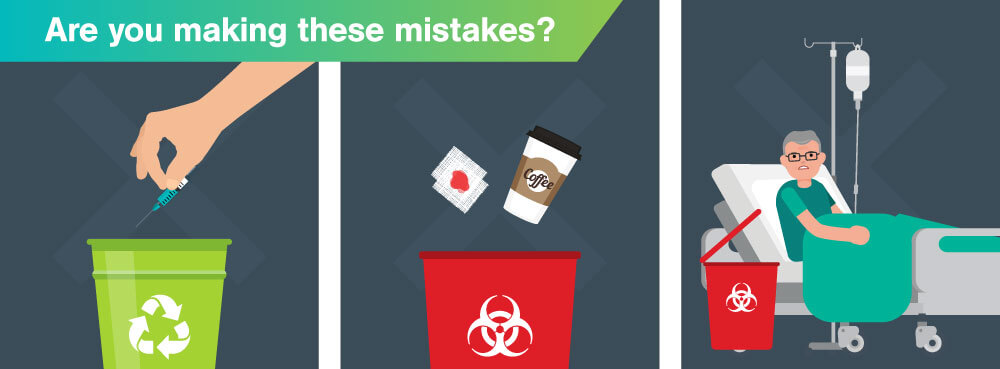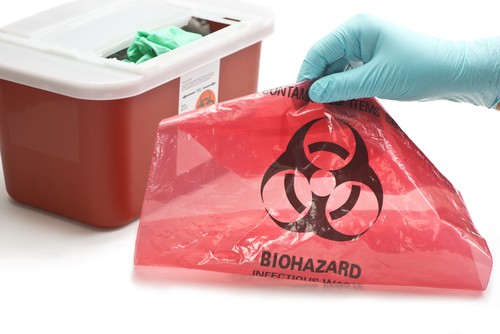Ensuring Safe Handling and Disposal of Medical Waste
Making sure risk-free handling and disposal of medical waste is of paramount significance in healthcare settings. Inappropriate administration of clinical waste can present significant dangers to the environment, public wellness, and healthcare employees. This necessitates adherence to strict standards and methods for its risk-free handling and disposal. In this introduction, we will explore the importance of correct medical waste administration, the dangers connected with improper handling and disposal, along with the standards and techniques that can be executed to ensure its risk-free disposal. Additionally, we will certainly review the value of training and education for healthcare professionals in order to maintain a risk-free and clean medical care environment. By adhering to these methods, we can successfully alleviate the potential risks connected with medical waste.
Importance of Appropriate Medical Waste Monitoring
Proper medical waste administration is of utmost significance in making certain the security and well-being of medical care specialists, people, and the basic public. Clinical waste refers to any waste generated by healthcare centers during the medical diagnosis, therapy, or immunization of animals or humans. This waste can present severe wellness threats if not managed and thrown away effectively.
One of the main reasons that proper clinical waste management is crucial is to avoid the spread of contagious conditions. Medical waste, such as made use of needles, infected dressings, and organic materials, can bring unsafe microorganisms. Otherwise taken care of and thrown away correctly, these microorganisms can be transmitted to health care employees, patients, waste trainers, and even the public, bring about the possible outbreak of illness.
Furthermore, correct clinical waste monitoring helps protect the setting - medical waste removal service. Medical waste has hazardous materials, including chemicals, pharmaceuticals, and contaminated materials. When not handled properly, these substances can infect dirt, water bodies, and the air, posing a considerable danger to ecological communities and public health and wellness
In addition, effective medical waste administration makes sure compliance with worldwide standards and local laws. Federal governments and regulative bodies have actually developed procedures and standards to guarantee the risk-free handling, storage, transport, and disposal of clinical waste. Sticking to these policies is crucial to prevent lawful repercussions and preserve the credibility and reliability of healthcare centers.
Risks of Improper Handling and Disposal

If clinical waste is not correctly disposed of,Clients can likewise be exposed to these contagious illness. For example, if polluted needles or other sharps are not taken care of in assigned puncture-proof containers, they might unintentionally puncture individuals, resulting in possible infections. If medical waste is not segregated properly, there is a threat of cross-contamination in between various types of waste, additional raising the chances of illness transmission.
Improper disposal of clinical waste can also have damaging results on the setting and the public. If clinical waste is not dealt with and gotten rid of properly, it can pollute water resources, soil, and air, bring about the spread of contaminants and illness. This can have long-term repercussions on ecosystems and public health and wellness.
Guidelines for Safe Handling of Medical Waste
Applying efficient protocols for the secure handling of clinical waste is necessary in ensuring the security of health care experts, individuals, and the general public. These standards are critical in decreasing the risks connected with the handling and disposal of clinical waste, such as infections, injuries, and environmental contamination.
Primarily, health care facilities must develop a comprehensive waste management strategy that sticks to regional, nationwide, and global guidelines. This plan should include clear guidelines on waste segregation, packaging, storage, labeling, and transport. It is crucial to divide various kinds of waste, such as sharps, transmittable products, pharmaceuticals, and non-hazardous waste, to prevent cross-contamination and advertise secure disposal.
Furthermore, healthcare workers must get complete training on correct waste handling techniques. They need to be informed on the possible risks of medical waste, the appropriate use individual protective devices (PPE), and the appropriate procedures for managing, transporting, and taking care of various sorts of waste.
Furthermore, healthcare centers should consistently keep an eye on and audit their waste management practices to make sure compliance with guidelines. This consists of carrying out routine inspections, evaluating waste handling treatments, and supplying responses and training to team members.
Reliable Strategies for Waste Disposal
To guarantee the safe handling and disposal of medical waste, it is important to employ effective strategies for waste disposal. Medical waste can present substantial risks to public wellness and the atmosphere otherwise taken care of and taken care of effectively. Therefore, health care facilities and waste management organizations have to carry out appropriate methods to mitigate these risks.
It entails separating various kinds of clinical waste based on their qualities. Healthcare facilities need to offer clear standards and training to staff members on just how to set apart waste appropriately.

In addition, medical care centers ought to collaborate with try here accredited waste monitoring business to ensure appropriate disposal of clinical waste. These companies have the expertise and devices needed to securely handle and get rid of of medical waste in conformity with guidelines and best techniques.
Training and Education for Medical Care Professionals
Health care specialists play a critical role in making certain the safe handling and disposal of medical waste with detailed training and education. It is crucial for health care companies to have a deep understanding of the potential risks connected with medical waste and the appropriate methods for its administration. By receiving appropriate training, medical care specialists can minimize the possible transmission of infectious diseases, prevent ecological contamination, and shield both themselves and the general public.

Additionally, training programs should emphasize making use of individual safety devices (PPE) and appropriate hand health methods when dealing with clinical waste. medical waste removal. Healthcare experts should understand just how to properly use and dispose of PPE to safeguard themselves from prospective exposure to unsafe materials. They need to likewise be enlightened on the value of normal handwashing and the proper usage of hand sanitizers to decrease the spread of contagious conditions
Continuing education and learning and routine updates on clinical waste administration methods are crucial for health care specialists. As regulations and guidelines advance, it is vital to maintain healthcare companies informed regarding any adjustments in methods and ideal methods. This will make certain that they stay up-to-date and maintain a high standard of safety and security in handling and getting rid of of clinical waste.
Final Thought
In conclusion, proper handling and disposal of clinical waste is important to make certain the safety of healthcare experts, people, and the setting. By sticking to these practices, we can mitigate the prospective dangers linked with medical waste.
Clinical waste refers to any type of waste generated by medical care centers throughout the medical diagnosis, therapy, or immunization of human beings or animals. If medical waste is not segregated correctly, there is a risk of cross-contamination between various kinds of waste, more enhancing the opportunities of condition transmission.
It is crucial to divide different types of waste, such as sharps, infectious products, pharmaceuticals, and non-hazardous waste, to avoid cross-contamination and promote secure disposal. WasteX Medical Waste Disposal.
To ensure the safe handling and disposal of medical waste, it is crucial to utilize effective methods for waste disposal. Furthermore, healthcare facilities must establish a routine waste collection and transport schedule to stop waste accumulation and reduce the threat of crashes or contamination.